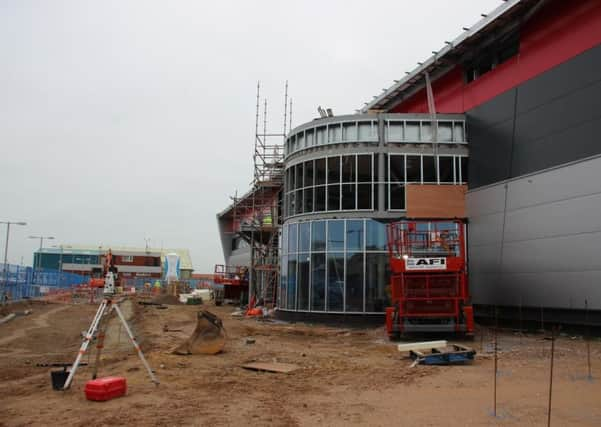Fylde is plugged in for the future


Leaders at the Lancashire Enterprise Partnership (LEP) estimate the county’s £564m energy sector employs around 40,000 people, with that number set to grow by several thousand as our sources of energy diversify.
Dr Michele Lawty-Jones, director of the Lancashire Skills Hub at the LEP, said millions of pounds were already being invested in developing workers of the future.
Advertisement
Hide AdAdvertisement
Hide AdBut many more would be needed ‘to maximise the economic potential’ of the industry.She said: “Without a co nstant pipeline of bright and capable young people with a good grounding in core STEM subjects flowing into our universities and colleges, we still might not have enough home-grown talent to take full advantage of a thriving, diverse and dynamic energy sector in Lancashire.”
Energy UK estimated in 2015 that gas produced 30 per cent of the UK’s energy need, coal 22 per cent and oil one per cent. Nuclear generated 21 per cent and renewables made up 25 per cent which is set to rise to 30 per cent by 2020 to meet climate change obligations.
Energy saving and increasing efficiency is set to deliver the biggest effect on our energy usage. Ed Davey, when he was climate secretary in the coalition government pointed out in November 2012, that a 10 per cent reduction in usage by 2030 meant five fewer power stations and £4bn cut from bills.
The UK’s energy use in 2014 stood at 2,249 TWh.
The energy and environment technologies sector has been identified as one of the most important by the Lancashire Enterprise Partnership. It says the sector employs around 40,000 people in over 5,200 businesses most of which are micro-businesses.
Advertisement
Hide AdAdvertisement
Hide AdIt says nuclear, offshore gas, oil and wind, onshore wind, waste recovery and environmental technology services and manufacture are the most important for the county and the sector generates between £564m - £2bn Gross Value Added a year. Last week the Office for National Statistics said the renewable energy sector generated £14.9bn worth of business.
The change in the sector throws up huge challenges - but also opportunities and Lancashire is moving to position itself as a hub of energy expertise and skills to cash in on this increasingly more complex sector.
Dr Lawty-Jones said: “Energy, environmental industries and the wider supply chain are hugely important to the Lancashire economy and are set to create several thousand new jobs within the next 20 years.
“This is being driven by the fact that the generation, capture, storage, management and distribution of energy is increasingly complex, and we as a society now need a much wider mix of energy sources, including low-carbon and renewables, in order to be sustainable. This means we also need workers with new and different skills if we are to maximise the economic potential the energy market offers.
Advertisement
Hide AdAdvertisement
Hide Ad“Further, within Lancashire’s more established energy industries such as nuclear and offshore gas, we have an ageing workforce which will soon need to be replaced by a younger cohort of engineers, technicians, researchers and scientists who are ready to take these industries forward, and help us compete within a rapidly changing international energy sector.
“In the last few years we have also made substantial investments in many of Lancashire’s further education colleges to inspire the next generation of energy workers, including a £6.2m contribution to the £9.8m Lancashire Energy HQ in Blackpool, which will house the UK hub of the National College for Onshore Oil and Gas (NCOOG), which will open later this year. Lancaster University and UCLan also have internationally recognised centres of excellence in energy and environmental studies which provide progression opportunities for students, and support local businesses to innovate.
“But even with our higher and further education partners geared up to train industry-ready energy professionals, without a constant pipeline of bright and capable young people with a good grounding in core STEM subjects flowing into our universities and colleges, we still might not have enough home-grown talent to take full advantage of a thriving, diverse and dynamic energy sector in Lancashire.
“This is why the Skills Hub and LEP is also working alongside employers, teachers and careers advisers within our secondary schools to promote careers like engineering and advanced manufacturing to our brightest and best young people, highlighting how exciting and rewarding a job within Lancashire’s 21st century energy economy is set to be, both now and in the future.”